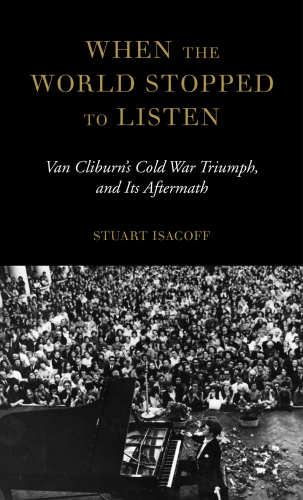
When the World Stopped to Listen
Van Cliburn's Cold War Triumph, and Its Aftermath
کتاب های مرتبط
- اطلاعات
- نقد و بررسی
- دیدگاه کاربران
نقد و بررسی

November 28, 2016
Unlike Nigel Cliff’s recent book on the same topic, Moscow Nights, Isacoff’s well-researched account of the inaugural Tchaikovsky Competition in Moscow in 1958 focuses less on politics and more on piano and Van Cliburn, who won that competition. While researching the book, he talked to an impressive list of pianists and others of all nationalities, and even unearthed the second-round scorecard, laying to rest the question of how Sviatoslav Richter voted. There are touching stories, such as the reconciliation of the long-feuding judges Heinrich Neuhaus and Alexander Goldenweiser, but there are also unnecessary cul-de-sacs, including details of Spaso House, the residence of the U.S. ambassadors to the Soviet Union (and now to Russia). Isacoff (The Natural History of the Piano) keeps the musicology to a minimum, but there are some head-scratching passages, such as when he talks about the “physical separation that exists between the pianist sitting at one end of the instrument and the piano’s hammers hitting the strings at the other.” He also hints at a New York Times–led conspiracy to promote Cliburn. “Where was the New York Times” when Leon Fleisher won the Queen Elisabeth Competition in 1952, he asks. The fact that Isacoff wrote this book and not one about Fleisher and the Queen Elisabeth would seem its own best answer.

February 1, 2017
He was the talk of the classical music world, as idolized as any pop star, and an unwitting player in the geopolitical struggle between the two superpowers of the 20th century.He was pianist Van Cliburn (1934-2013), the "long-legged young Texan" from the small town of Kilgore, who, at age 23 in 1958, was the surprise winner of Moscow's inaugural Tchaikovsky International Piano Competition, which Isacoff (A Natural History of the Piano, 2012, etc.), a musician and Wall Street Journal contributor, calls "a high-culture version of the World Cup." In retrospect, Cliburn's victory may not have been that big a surprise. This was a young man whose piano-teacher mother, Rildia Bee, would "playfully suspend him over the keys of the piano" when he was a child. That he resisted the temptation to pound on the keys was, to Rildia Bee, "a sign of unusual sensitivity." She was right. Soon, he was studying at Juilliard with famed piano teacher Rosina Lhevinne, entertaining audiences on Steve Allen's Tonight Show in 1955, and, three years later, performing a rendition of Rachmaninoff's famously difficult Piano Concerto No. 3 that inspired members of the competition's jury to proclaim that Cliburn had a "Russian soul." Isacoff does an excellent job documenting suspicions of corruption in the competition and the result's effect on U.S.-Soviet relations. He gets sidetracked, however, with details about the other students, and there are extraneous passages that fail to enlighten--e.g., Truman Capote's dissatisfaction with a Leningrad hotel in 1955. Nonetheless, the author offers a touching portrait of Cliburn, a natural performer who received injections of an amphetamine-laced "miracle tissue regeneration" to combat nervousness-induced weight loss and whose nonchalance and lack of curiosity--he was a poor student and was chronically late, even to his own performances--were primary reasons that he never again reached the heights of his early success. A moving if uneven biography of a man whose career was marked by moving and uneven performances.
COPYRIGHT(2017) Kirkus Reviews, ALL RIGHTS RESERVED.

January 1, 2017
Isacoff (A Natural History of the Piano) recounts the 1958 victory of a small-town Texas pianist in the First International Tchaikovsky Competition. Van Cliburn became one of the most recognizable Americans in the world and was especially beloved in the Soviet Union. The author's deftly written narrative places Cliburn both in the world of classical music and the larger Cold War conflict. Isacoff covers ground traversed by Nigel Cliff's Moscow Nights. Both rely on numerous interviews, as well as recently published Soviet documents. There are differences: both detail Cliburn's "blow-up" during rehearsal for his appearance on the Steve Allen Show in May 1958, but Isacoff claims that Dr. Max Jacobson (the infamous "Dr. Feelgood") was summoned to help soothe the overwrought pianist with an injection--a detail left out of Cliff's book, and which presumably derived from Schuyler Chapin. Nevertheless, Cliff's book is better documented (over 50 pages of notes), while Isacoff has the advantage of interviews with several persons (including Cliburn himself) not available to Cliff. VERDICT Recommended for those interested in classical music and the Cold War. There are sufficiently varied nuances that interested readers may want both Cliff's and Isacoff's books.--Bruce R. Schueneman, Texas A&M Univ. Lib., Kingsville
Copyright 2017 Library Journal, LLC Used with permission.

April 1, 2017
Fans of pianist Van Cliburn (19342013)and there are many, the world overcan rejoice in the second biography in as many years to focus on his Cold War win at the first Tchaikovsky International Piano Competition in Moscow in 1958. Nigel Cliff's Moscow Nights (2016) focused on the glory; music aficionado Isacoff (A Natural History of the Piano, 2011) places the glory within an illuminating framework that includes the pianist's touching final years. The harshness of world events and real life intrudes. Cliburn's friend, competition pianist Liu Shikun, suffered under Mao for many years. Dmitri Shostakovich, the competition's chairman, was treated unfairly by Soviet authorities. Cliburn was perhaps overly dependent on his mother, and his health declined with time. Isacoff doesn't miss the lovely aspects, though, including Cliburn's epistolary friendship with a Russian woman he met in 1958, his many beloved acquaintances and adventures, and his partner of many years, Tommy Smith. This well-rounded biography will move readers in ways much different than Moscow Nights; both are essential reading for music lovers, and both are fascinating.(Reprinted with permission of Booklist, copyright 2017, American Library Association.)

























دیدگاه کاربران